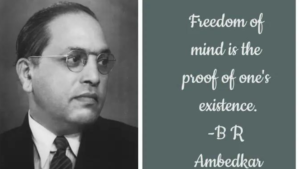Dr. Bhimrao Ramji Ambedkar, widely known as B.R. Ambedkar, was a towering figure in India’s struggle for social justice and equality. Born in a Dalit family, he rose above the severe socio-economic constraints of his time to become one of the foremost leaders in the fight against caste discrimination. A brilliant scholar, accomplished lawyer, and astute politician, Ambedkar played a pivotal role in shaping modern India. His most notable contribution was as the principal architect of the Indian Constitution, where he embedded principles of social justice, democracy, and human rights. Ambedkar’s relentless pursuit of equality and his efforts to uplift the marginalized sections of society have left an indelible mark on the nation’s history and continue to inspire generations.
Born on April 14, 1891 and passing away on December 6, 1956, Bhimrao Ramji Ambedkar, often referred to as Babasaheb, was a prominent figure in Indian nationalist, jurist, Dalit political leadership, and Buddhist revivalist movements. In addition, he was the mastermind behind the creation of the Indian Constitution. Ambedkar, who was born into a poor family of untouchables, devoted his entire life to battling against social inequality, the system of Chaturvarna, which is the Hindu categorization of human society into four different varieties, and the caste system in India. On top of that, he is regarded with being the one who initiated the Dalit Buddhist movement. An award that is considered to be India’s highest civilian accolade, the Bharat Ratna, was bestowed to Ambedkar.
In spite of the many social and financial challenges he faced, Ambedkar was able to become one of the first “untouchables” in India to earn a college degree. As a result of his studies and research in the fields of law, economics, and political science at Columbia University and the London School of Economics, Ambedkar eventually earned law degrees and multiple doctorates. He then returned to India as a renowned scholar and practiced law for a few years before publishing journals advocating for political rights and social freedom for India’s untouchables.
Ambedkar accepted the invitation extended to him by the newly formed government, which was led by the Congress party, to serve as the nation’s first law minister after India gained its independence on August 15, 1947. As of the 29th of August, Ambedkar was given the position of chairman of the Constitution Drafting Committee, which was tasked by the Assembly with the responsibility of writing the new Constitution for free India. As a result of his work in drafting, Ambedkar received a great deal of appreciation from his contemporaries and contemporary commentators.
The vast reading that Ambedkar had done in Buddhist scriptures and his research into sangha practice among early Buddhists were going to be of great use to him in this endeavour. Voting by ballot, norms of debate and precedence, and the utilisation of agendas, committees, and proposals were all practices that were adopted into Sangha practice in order to conduct business. The Sangha practice itself was patterned after the oligarchic method of government that was utilised by the tribal republics of ancient India, such as the Shakyas and the Lichchavis.
Consequently, despite the fact that Ambedkar based his Constitution on Western models, the spirit of the Constitution was deeply Indian and tribal in nature. The text prepared by Ambedkar provided constitutional guarantees and protections for a wide range of civil liberties for individual citizens, including freedom of religion, the abolition of untouchability and the outlawing of all forms of discrimination Ambedkar argued for extensive economic and social rights for women, and also won the Assembly’s support for introducing a system of reservations of jobs in the civil services, schools and colleges for members of scheduled castes and scheduled tribes, a system akin to affirmative action.
The parliamentarians of India had the hope that by implementing this measure, which had been initially conceived of as a temporary solution on a need basis, they would be able to eliminate the socio-economic disparities and the lack of chances that exist for India’s economically disadvantaged strata. The Constituent Assembly ratified the Constitution on November 26, 1949, making it part of the Constitution. In this regard, Ambedkar has made a significant contribution.
Dr. B.R. Ambedkar’s life and contributions have had a profound and lasting impact on India. His unwavering commitment to social justice, equality, and human rights laid the foundation for a more inclusive and democratic society. As the chief architect of the Indian Constitution, Ambedkar ensured that the values of liberty, equality, and fraternity were enshrined in the nation’s legal framework. Beyond his constitutional work, his advocacy for the rights of Dalits and other marginalized communities transformed the social fabric of India. Ambedkar’s legacy is a testament to his extraordinary vision and dedication to creating a just society. His contributions continue to guide and inspire the ongoing struggle for social justice and equality in India.

